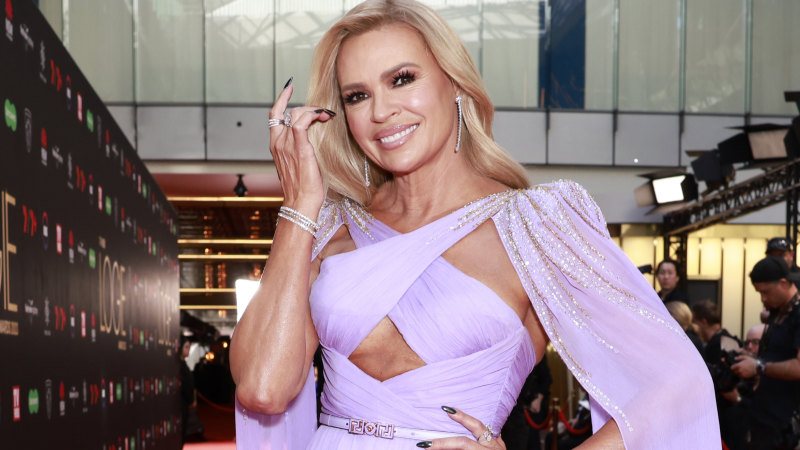Save articles for later
Add articles to your saved list and come back to them any time.
There’s very little the Logies and the Ashes have in common – aside from the fact that Australian TV’s self-declared night of nights can often feel like it also runs for six weeks.
But on Sunday night, as the likes of Sam Neill, Tony Armstrong and Harriet Dyer piled into The Star to celebrate the year in TV, while our openers David Warner and Usman Khawaja took on the English at the Oval, I couldn’t help but detect a depressing confluence.
Sonia Kruger wins the Gold Logie Award on Sunday night.Credit: Getty Images
Around the same moment Khawaja was being feted for becoming the leading run-scorer in this gripping series, and rightly recognised as one of our best players, Seven’s Sonia Kruger was accepting the Gold Logie – the most prestigious prize in the Australian entertainment industry.
What do these seemingly incongruous events have in common? Well, according to comments Kruger made in 2016, where she called for a ban on Muslim migration, people like Usman Khawaja, and people like me, shouldn’t be allowed into this country.
In 2019, the NSW Civil and Administrative Tribunal found Kruger had vilified Muslims after she made the comments on Today (broadcast on Nine, the owner of this masthead). In response to a column written by Andrew Bolt, Kruger said: “Personally I think Andrew Bolt has a point here that there is a correlation between the number of Muslims in a country and the number of terrorist attacks.
“Personally, I would like to see it [the immigration of Muslims] stopped now for Australia,” Kruger said.
The tribunal said Kruger “made it clear she did not think every Muslim in Australia or overseas was a fanatic”, but taken in context, her comments were likely to encourage or incite “feelings of hatred towards, or serious contempt for, Australian Muslims as a whole” by linking them to terrorist attacks.
Those comments, Kruger’s failure to walk them back, and the fact they weren’t an impediment to her winning the biggest prize in TV are a sad reflection on Australian culture. It’s tempting to say something cliché about how the situation should be a wake-up call to how unseriously Australia, and in particular the entertainment industry, treats issues of race and diversity, but I am under no illusion this will change anything.
For my sins, I have always been someone who cares too much about award shows, whether it’s the Oscars, Emmys or our own Logies. Not so much because I think they are perfect, subjective statements on what is the “best”, but because I love TV and film, I love storytelling, I love our history of telling uniquely Australian stories, and I think it’s important to celebrate and acknowledge the artists who make them– even if the ceremonies are almost always embarrassing.
The Logies are routinely ridiculed as being easy to game (hello Tom Gleeson), have an opaque judging process, and are subject to the whims of whatever broadcaster is in charge. But it’s still a disappointing result, particularly if you care about Australian TV.
Every day I do a job that is focused on covering the Australian entertainment industry. The people who run it, many of whom I know and deal with regularly, are people who have thought that Kruger parroting Donald Trump’s lines on migration should not be an impediment to her success. Not only did no one with any influence or power in this industry demand contrition or an apology, they thought that even without one Kruger deserved to be put on a pedestal and recognised as one of the most important and influential figures on TV – alongside the likes of Hamish Blake, Waleed Aly and Asher Keddie.
The fact Kruger was even nominated was, frankly, grim enough. It was another reminder that while there may be some lines you can’t cross in this industry, vilifying Muslims isn’t one. As the campaign went on, and it became clear Seven was throwing everything they had into backing Kruger, I became resigned to that fact that she was likely going to be anointed. All networks are guilty of these kinds of shameless campaigns, but Seven took it to an embarrassing level.
Pleas from news presenters the night of the Logies to back her, rejigging the rules so votes could be lodged during the broadcast (which was on Seven), getting Kruger to host the red carpet ceremony, and deeply cringy statements of support from other Seven presenters on the night. Even without the controversial comments it was all turning into a bit of a joke. The fact all of this was being done in the service of someone with Kruger’s record made it even bleaker.
Of course whether Kruger won or lost the Gold Logie ultimately has little bearing on Australia’s approach to race and religion, and wouldn’t make a dent in this country’s deeply ingrained Islamophobic attitudes. But it does send a few signals.
It signals to people like me that the most influential people in Australia don’t really care if we’re vilified. It’s a signal to people like Usman Khawaja, who told me earlier this year about of the racial vilification he experienced growing up, that nothing has truly changed in this country. Furthermore, it’s a signal to the local entertainment industry that while colleagues in the US are taking a stand and fighting for the future of their art, here in Australia mediocrity and far-right views on Muslim immigration worldview will nab you the biggest prize we have.
Kruger’s win wasn’t a surprise or a shock. The fact that it was so predictable and so mundane is precisely what makes it so depressing and deflating.
Find out the next TV, streaming series and movies to add to your must-sees. Get The Watchlist delivered every Thursday.
Most Viewed in Culture
From our partners
Source: Read Full Article



